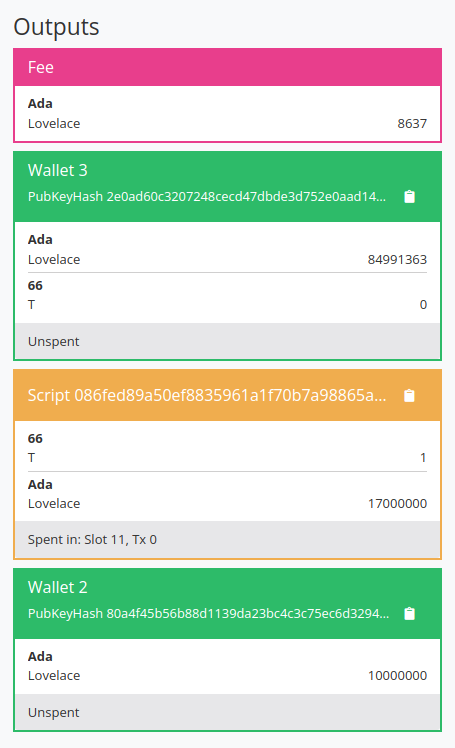In the second transaction of the auction example, these are the output EUTxO's. In the final transaction, only wallet 1 and the script are inputs. How does the script know that wallet 3 has done the highest bid? I would expect that the script also stores 'wallet 3' as data, so it's known who had done the bid. Or, in the closing Tx, how does the script know that wallet 3 did the bid (from the playground, this doesn't seem to be stored.)
1 Answer
Each change in state in the auction contract passes a new datum (arbitrary data). The auction datum is made up of the 'Auction' and 'Bid' records. The bid record has a 'bBidder' field which is the public key of the bidder. You can't see this in the playground because the actual datum value isn't stored on-chain, the hash is which allows others to validate. When a validator (or the simulator) calculates the highest bidder, it does it from the start based off the series of eUXTOs'.
As to how does the auction example know who started the bid? When a new eUXTO is added to the series of bids, the validator calculates the previous bids up to the current one, in order to discover the datum. This datum is then used in the contract script again to place the next bid.
The reason this can be done is because the result is entirely deterministic. Based off the same inputs (transactions in/endpoints), you'll get the same output.
-
-
OK, the datum is not shown in the explorer/playground - that was not clear to me. (I thought it would show the datum, since it does show the some other values, such as how much Ada and T it has in it's state). btw, if the actual datum value isn't stored onchain, it's stored offchain, right? Where exactly is it stored? (Is it on 1 place, which doesn't seem like a good idea to me, or is it also somehow redundant?)– Kurt SysCommented Jan 14, 2022 at 14:21
-
1The datum isn't stored anywhere. The hash of the datum is stored on-chain. Because Plutus is deterministic, whenever a node is trying to run your request, it can re-calculate the datum. Commented Jan 14, 2022 at 14:24
-
Since I previously mentioned that datums are never stored on-chain, I thought it relevant to note that Post-CIP32 (coming June/Oct), this will no longer be true, and it will be possible to store datums on-chain. Commented Apr 1, 2022 at 6:53
